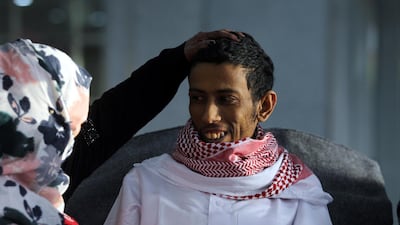Humanitarian organisations are ready to exchange detainees “within hours” in a bid to broker a ceasefire in war-torn Yemen but have been delayed by political wrangling.
International Committee of the Red Cross (ICRC) President Peter Maurer told The National on Wednesday that he hopes to have "numbers acceptable to all sides [of the Yemen conflict] for a first bunch of releases and exchange", which the aid organisation is ready to help facilitate alongside the UN.
The ICRC and the United Nations have been involved in talks with officials from both government and Houthi rebels to help bring about the transfer of Yemenis detained in the civil war. International law states that in armed conflicts, the ICRC must be granted access to all prisoners in order to verify the conditions of their detention and to restore contacts between with their families.
“We could start within hours, and we are now waiting for weeks,” he said.
The final lists of names have been delayed as Houthi rebels have been slow to confirm that they are actually holding many of the names submitted by the government delegation. The names of four senior government officials have been particular contentious with the rebels refusing to even discuss the matter.
The men are former defence minister Gen Mahmood Al Soubaihi; Maj Gen Naser Mansour Hadi, who is the brother of President Abdrabu Mansur Hadi, Maj Gen Faisal Rajab and the leader of Yemen's Islamist Al Islah party, Mohammed Qahtan. They have been detained since 2015 when the rebels seized much of the country.
Government sources have told The National that the release of the four would represent a significant step forward in building confidence and ensuing a progress can be made in peace talks.
The lists so far submitted by the rebels and the government are made up of thousands of detainees.
Mr Maurer is expecting a “big” exchange between different factions of the Yemen conflict, but said it was “up to political parties to give the greenlight, it’s their political agreement”.
ICRC’s president warned against complacency in bringing stability to Yemen, which has seen up to 80 percent of the population depending on aid handouts – the highest of any country globally.
“Let’s not fool ourselves. When this happens, we won’t have solved much yet. But it will be an important step forward. There are more agreements to come… once the Hodeidah ceasefire is implemented, and they are badly needed because Yemen remains the biggest humanitarian crisis.”
The port of Hodeidah is a frontline for aid workers in Yemen. In February, the UN warned that rice was rotting at the Red Sea Mills silo near the port despite a ceasefire agreed between the government and the rebels due to ongoing clashes. Aid agencies have since been able to reach the site and are assessing what is still fit to be handed out.
Elsewhere in the region, the former Swiss diplomat accused European powers of pushing away sub-Saharan migrants hoping to reach a better life across the Mediterranean Sea.
“European powers transfer the problem down south. These are huge issues. Then in the Sahel, people die because they’re on their fifth attempt.”
European Union member states were accused in February in an open letter by Oxfam of being "complicit" in the deaths of migrants in their attempt to prevent boat crossings.
An EU-backed deal between Libya and Italy two years ago saw the exchange of Italian funding and support for Libya’s coastguards in return for Libya preventing people from crossing the Mediterranean Sea to Europe.
According to the ICRC, the share of Libyans internally displaced within the country is higher by percentage compared to any other African nation.
Mr Maurer also warned the international community against leaving Syrian refugees in permanent exile from their homeland and by doing so turning them into the “new Palestinian issue”.
“The longer you wait, the more difficult it will be to bring people back to normal life”.

